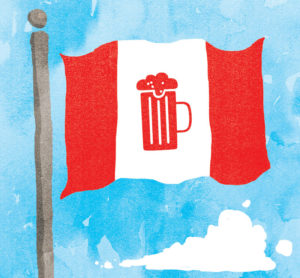 A few weeks back I was perusing the 2015 BJCP Style Guidelines (yes, I do that for fun) and reflecting how many styles are anchored in a particular region. Not just the obvious of Germany, England and Belgium, but also places like Kentucky, Finland, Italy and Argentina. Beer styles really have a geographic grounding, even if they are at the same time international (in the sense any style can be brewed anywhere).
A few weeks back I was perusing the 2015 BJCP Style Guidelines (yes, I do that for fun) and reflecting how many styles are anchored in a particular region. Not just the obvious of Germany, England and Belgium, but also places like Kentucky, Finland, Italy and Argentina. Beer styles really have a geographic grounding, even if they are at the same time international (in the sense any style can be brewed anywhere).
I got pondering whether any beer style can be considered Canadian by origin or profile. That pondering turned into a little research which turned into beer columns – for Planet S/Prairie Dog (read here), my Beer 101 column (out any day), and CBC (the topic of my column tomorrow). My answer is “not really”.
Historically, before prohibition, there likely were Canadian styles, or at least distinctly Canadian interpretations of traditional styles. Canadian brewers leaned heavily on either British or German brewing approaches, but local ingredients, water and consumers likely led to Canadianized interpretations.
Alas, that all disappeared with prohibition and the dominance of North American Pale Lager.
The only style we can claim as our own is – ahem – Ice Beer. Yes, the infamous bastard-child of eisbier was born in Canada during one of the many battles between Molson and Labatt in the 1990s. As a mainstream product it only lasted a few years, but it does linger on today in the high octane discount section of the liquor store for those looking for a quick, cheap buzz.
Some claim that Cream Ale is a Canadian-style, and it is true that for a period after prohibition, cream ales were very popular in Canada. However, it was a style born in the U.S. and adopted by Canadian brewers, so I am not sure just how Canadian it really is.
Today lots of breweries stick the term “Canadian” onto their beer – Canadian Pale Ale being the most ubiquitous. But that is more marketing than stylizing. Is there really anything that makes a Canadian Pale Ale different than other pale ales?
Canadian craft brewers take inspiration from beer around the world. We make beer that people make elsewhere. That is not a bad thing, but it does mean we lack a distinctly geographic grounding for our beer. It is not just because we are a young country and haven’t had hundreds of years to refine a style like England or Germany (atlhough that is an important point). Modern styles have popped up with a geographic linnk – think Cascadian Dark Ale or West Coast IPA. We don’t have such a thing here.
There is no such thing as a Canadian beer style, I am afraid
I realize I am being a bit provocative with this statement; it doesn’t really matter in the grand scheme of beer. But Canada has not developed an identifiable approach to beer. In part, I think, this is due to our regional character. It may be more fruitful to look for regional styles, like a B.C. IPA or a Quebec Abbey Ale. I don’t think those styles exist yet either – how different is a Quebec Tripel from a Belgian one? – but if we were ever to have a Canadian style, I suspect we are more likely to spot it in one of our regions, rather than across the country.
And THAT is distinctly Canadian.

August 18, 2016 at 3:31 PM
I feel you may have missed a very cool style that certainly has distinct Canadian roots– the Spruce Beer!
Check it out:
https://en.wikipedia.org/wiki/Spruce_beer
August 22, 2016 at 10:41 AM
Grant, interesting thought. However, there is evidence of spruce beer being made in Europe as long ago as the 1500s. So Canada’s claim to it may be contested. Thanks for commenting!
http://zythophile.co.uk/2016/04/20/a-short-history-of-spruce-beer-part-one-the-danzig-connection/